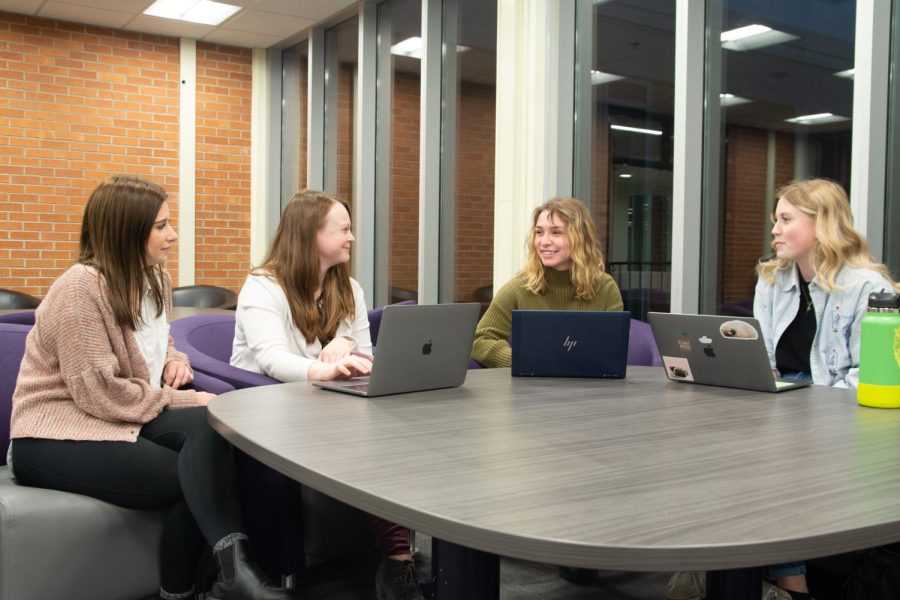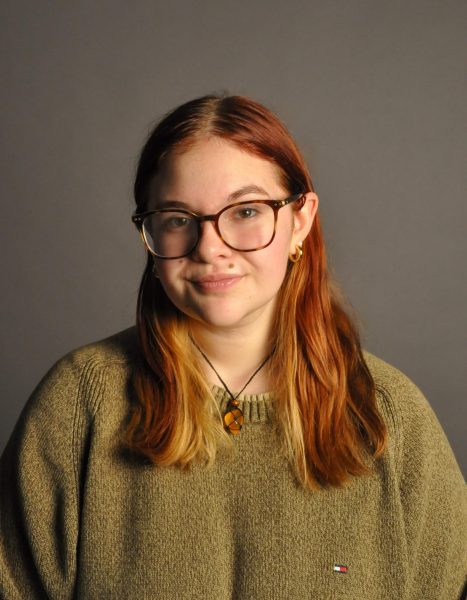Graduate students create informational website for affirming and inclusive sex education
Taylor Kline, Madison Nelson, Kailee Johnson and Kaysey Price sit at a table in Kryzsko Commons. These graduate students worked together on an advocacy project for a marginalized group in their Foundations of Counseling class.
November 16, 2022
When you are only taught half of something, it is often really challenging to gain a full picture. For example, you do not just learn multiplication in math; you are also taught division, addition and subtraction. We learn that there are multiple ways to do anything, so why only teach one? Graduate students Taylor Kline, Madison Nelson, Kailee Johnson and Kaysey Price decided to tackle this idea within the frame of sex education for their Foundations of Counseling class.
“We were reflecting on our own sex education,” Price said. “And then we got to thinking about how not good it is and absent altogether. We knew we wanted to do something along the lines of sex education, we just weren’t really sure what.”
This lead to the idea of advocating for inclusion on sex education.
“I started researching the laws of Minnesota and the curriculum standards and how that compared across the U.S.,” Nelson said. “Learning about it kind of inspired us to make that curriculum because there just is such a big need for it and the gap that is leaving so many students out is just crazy.”
Nelson explained that the curriculum in Minnesota does not have to be medically accurate, just technically accurate. If something is medically accurate, they cannot leave any information out. If it is technically accurate, they can pick and choose what to include. Nelson went on to give an example.
“That’s basically what they do. It’s like ‘we’re going to only have this information be for straight people’, or ‘we don’t want to talk about sex, we’re going to teach abstinence’,” Nelson said. “Minnesota pushes abstinence only and that’s what my experience was in high school.”
Sex education is vital for everyone to learn because it can have life-changing effects on people. Many students like Nelson have had half-baked sex education.
“I came from a small town and stuff like that was just not talked about. We were strictly abstinence only, so it just seems like people out there in the community didn’t exist because we were never taught about it,” Nelson said. “It just seemed like something like that didn’t happen. So if we were taught about that and normalized it more, people would feel a lot more affirmed. I think coming out of high school and coming into college was a big shock because I didn’t learn those things.”
This led the group to create a website with information and resources on all genders and sexualities. This website provides a variety of information on consent, gender identity and much more.
“[Sex education for only cis-gendered people] definitely kind of forces people in a box. When you’re learning about sex in general, [sex education now teaches] it has to be this way or not at all. I wasn’t taught terms about gender identity or sexual orientation,” Kline said. “So it’s like, ‘this is what you should do to not have sex’ or ‘if you do, do it this way’. It’s shutting them in and making them feel like they have something wrong with them or feeling like they’re being left out completely.”
The group also created flyers and are planning to put them up around campus for students to get the resources they need and to learn more about sex education that might have been left out of their own education.
“The website was just a place to put education, resources and our PowerPoint that we made,” Price said. “We just wanted it to be a place where people could go and get all the information that they needed and direct them to a different place if they needed more support.”
The group’s website can be found here: https://mnsexeducate.mailchimpsites.com














































